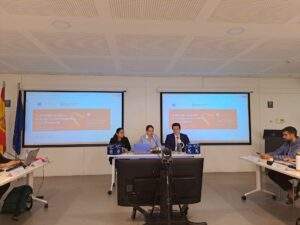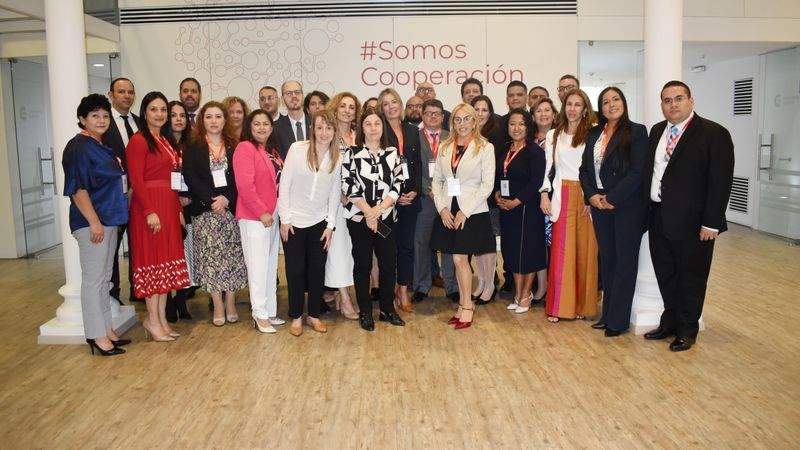From 29 to 31 October, Montevideo (Uruguay) hosted the meeting ‘Shared strategies in the fight against drug trafficking in Latin America and the Caribbean at the Annual Meeting of Contact Points of the Network of Anti-Drug Prosecutors of Ibero-America’. This network is one of the three networks of the Ibero-American Association of Public Prosecutors (AIAMP), with which COPOLAD III collaborates to strengthen the international alliance against drug trafficking.
During the meeting, the COPOLAD III guide of good practices on the performance of undercover agents in anti-drug operations was approved and the diagnosis and guidelines to address situations in which women and LGTBIQ+ victims of human trafficking are involved in the production, transit or commercialisation of drugs were presented. These people, as victims of human trafficking, often for the purpose of sexual exploitation, are coerced by criminal networks and become involved in the trafficking and sale of drugs. For this reason, a differentiated action with a gender and rights perspective that takes into account their social context is necessary. These guidelines are the result of collaborative work and discussion at two previous meetings, the first in Buenos Aires (October 2023) and the second in Barcelona (May 2024) and are the result of joint work between the Ibero-American Network of Specialised Prosecutors against Trafficking in Persons and Smuggling of Migrants (REDTRAM), the Network of Anti-Drug Prosecutors of Ibero-America (RFAI) and the Specialised Network on Gender (REG).
The central guidelines of this proposal are the strengthening of:
- The early identification of cases that require the articulated work of the three specialities (drug trafficking, trafficking and gender) which, for the first time, work together.
- Investigations focused on the victims and avoiding their re-victimisation.
- Institutional capacities for the adequate treatment of cases in which victims of human trafficking are criminalised for crimes related to drug trafficking.
On the other hand, the Programme team has presented the diagnosis of national regulations and the protocol for the use of foreign undercover agents in organised and transnational drug trafficking investigations. This protocol was officially presented in May of this year and has now been officially approved. The objective is to strengthen the capacity and effectiveness of police and anti-drug prosecutors, given that undercover agents are key to reaching the highest links in the drug trafficking chain.

In addition, a new initiative has been launched. COPOLAD III has proposed a collaboration between the programme, the RFAI, and AIAMP’s Environmental Crime Network to identify existing problems of articulation between the prosecution of drug trafficking and environmental crimes in order to jointly address the environmental impacts of the production and trafficking of illegal drugs and to further strengthen the construction of public policies on drugs, identifying challenges, options and possible solutions.
In the words of the co-coordinator of AIAMP’s Network of Anti-Drug Prosecutors, Matías Gabriel Álvarez, “the Network of Anti-Drug Prosecutors is celebrating its 10th anniversary, during which its main components have been consolidated: the identification of good practices and the operational exchange in transnational cases to improve the results of criminal prosecution. In this regard, I would like to highlight the work carried out together with COPOLAD on the use of undercover agents, a fundamental tool in our work. At this meeting we approved a document known as the ‘Palermo Guide’ to support the work of all prosecutors on this issue”.
The meeting was organised by the RFAI, coordinated by the Anti-Drug Prosecutor’s Office of Spain and PROCUNAR of Argentina, with the collaboration of COPOLAD and other actors such as the United Nations CRIMJUST Programme. Specialists from Argentina, Ecuador, Chile, Panama, Brazil, Spain, Colombia, Paraguay, Peru, Mexico, Guatemala and the Dominican Republic participated in the meeting.






